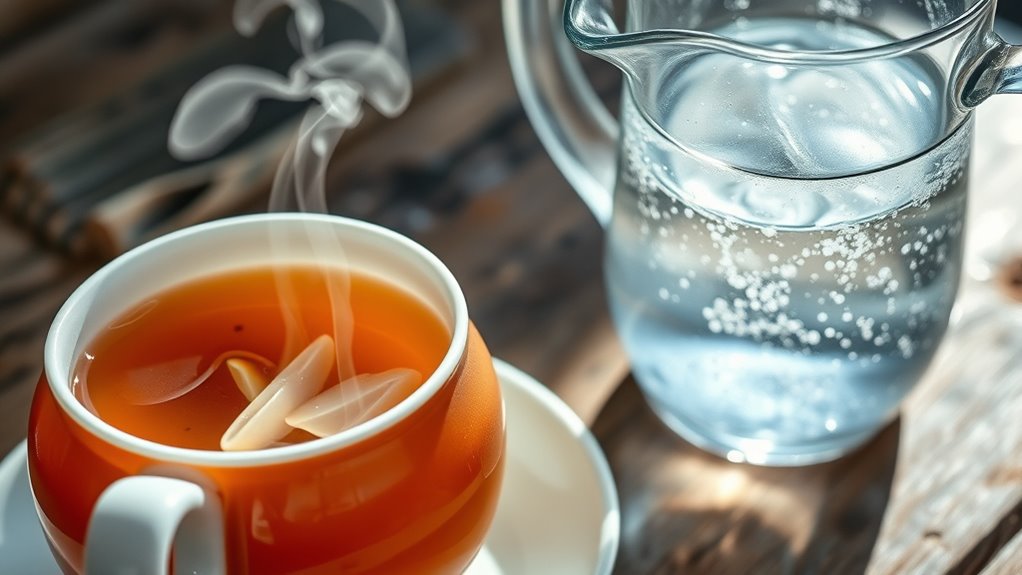Brewing tea with mineral water really does matter, as it can profoundly enhance the flavor, aroma, and mouthfeel of your cup. The minerals in the water—like magnesium and calcium—help bring out subtle notes and create a balanced, revitalizing brew. Using the right mineral water can make your tea taste cleaner, smoother, and more vibrant. If you want to reveal the true potential of your tea, discovering how mineral water influences each sip is essential.
Key Takeaways
- Mineral water’s mineral composition influences tea extraction and flavor, enhancing subtle notes and overall taste.
- Magnesium and calcium in mineral water improve sweetness and mouthfeel, enriching the brewing experience.
- Fewer impurities in mineral water ensure a clearer, fresher brew that showcases tea’s true essence.
- Choosing mineral water with a balanced mineral profile prevents undesirable flavors and optimizes flavor benefits.
- Using mineral water can reveal hidden nuances and add sensory complexity, elevating tea enjoyment.

Have you ever contemplated how the type of water you use can elevate your tea brewing experience? Using mineral water instead of tap water or filtered water can make a noticeable difference in how your tea tastes and feels. One of the key reasons is the water mineral benefits. Mineral water contains natural minerals like calcium, magnesium, and bicarbonates, which can influence both the brewing process and the final flavor of your tea. These minerals can interact with the tea leaves, subtly altering the extraction process and contributing to a richer, more complex flavor profile.
When you choose mineral water for brewing, you’re not just adding water—you’re enhancing the tea’s overall character. The mineral content can help bring out subtle notes that might be muted with regular tap water. For example, magnesium can accentuate the tea’s natural sweetness, while calcium can add a smooth, rounded mouthfeel. Bicarbonates can help balance acidity, resulting in a more balanced and satisfying cup. This is where tea flavor enhancement truly occurs; the mineral water acts as a catalyst that unlocks the full potential of your tea leaves.
Using mineral water isn’t just about flavor—it can also improve the clarity and freshness of your brew. Because mineral water is often less processed than tap water, it tends to have fewer impurities that can muddle the taste. This purity allows the true essence of your tea to shine through, whether you’re brewing delicate green teas or robust black teas. Plus, mineral water’s natural carbonation can add a slight effervescence to your cup, giving your tea a unique tactile experience that’s hard to replicate with still water.
However, it’s important to consider the mineral content of the water you choose. Not all mineral waters are created equal, and some might have high levels of sodium or other minerals that could negatively impact your tea. Opting for a mineral water with a balanced mineral profile ensures you get the benefits without any undesirable flavors. Additionally, understanding the water mineral benefits can help you select the best type of mineral water for your brewing needs, optimizing both flavor and health considerations. Ultimately, the water mineral benefits can elevate your tea brewing, transforming a simple ritual into a sensory experience. So next time you prepare your favorite tea, try using mineral water—you might just discover a new dimension of flavor and aroma that makes every sip more enjoyable.
Frequently Asked Questions
Does Mineral Water Affect Tea Acidity Levels?
When you ask if mineral water affects tea acidity levels, you’re really wondering about pH alteration and mineral impact. Mineral water’s mineral content can influence the tea’s pH, potentially making it more or less acidic. The minerals in the water, like calcium or magnesium, can alter the overall acidity and flavor profile. So, yes, mineral water can impact tea’s acidity due to its mineral impact and pH changes.
Can Mineral Water Change Tea’s Flavor Profile Significantly?
You might wonder if mineral water can change your tea’s flavor profile considerably. It definitely can, as mineral interactions influence taste, offering potential flavor enhancement. The minerals in the water can add subtle or pronounced notes, depending on their composition. This means your tea could develop a richer, more complex flavor, or sometimes an undesired metallic or bitter aftertaste. So, choosing mineral water carefully impacts your tea’s final flavor experience.
Is Mineral Water Better Than Tap Water for Brewing Tea?
Think of water as the canvas for your tea’s masterpiece—your choice influences aroma and clarity. You might find mineral water enhances tea aroma, offering a richer scent, while tap water’s potential impurities can cloud water clarity. While mineral water often provides a cleaner, more vibrant flavor, tap water’s convenience and cost make it a practical option. Ultimately, it’s about your preference and the tea’s delicate nuances.
Are There Health Benefits to Using Mineral Water in Tea?
You might wonder if using mineral water in tea offers health benefits. While tea mineralization with mineral water can add essential minerals like calcium and magnesium, the health benefits depend on your overall diet. Drinking tea brewed with mineral water can support hydration and contribute to mineral intake, but it’s not a substitute for a balanced diet. Overall, the mineralization might enhance your tea’s health benefits slightly.
How Does Mineral Content Influence Tea Brewing Time?
Think of mineral composition as a dance partner for your tea, guiding its brewing duration. When mineral content is high, it can speed up extraction, shortening brewing time. Conversely, softer water with fewer minerals might require a longer brew to develop full flavor. So, your mineral composition directly influences how long you should steep your tea, ensuring you get the perfect balance between strength and aroma.
Conclusion
So, brewing tea with mineral water is like adding a splash of personality to your cup—it can enhance or subtly change the flavor. While it might not turn your ordinary brew into a masterpiece, it’s worth trying if you’re curious. Think of it as a tiny adventure in your kitchen, where each sip could surprise you like a hidden gem. Ultimately, it’s your taste buds’ journey—dare to explore and enjoy every sip.










